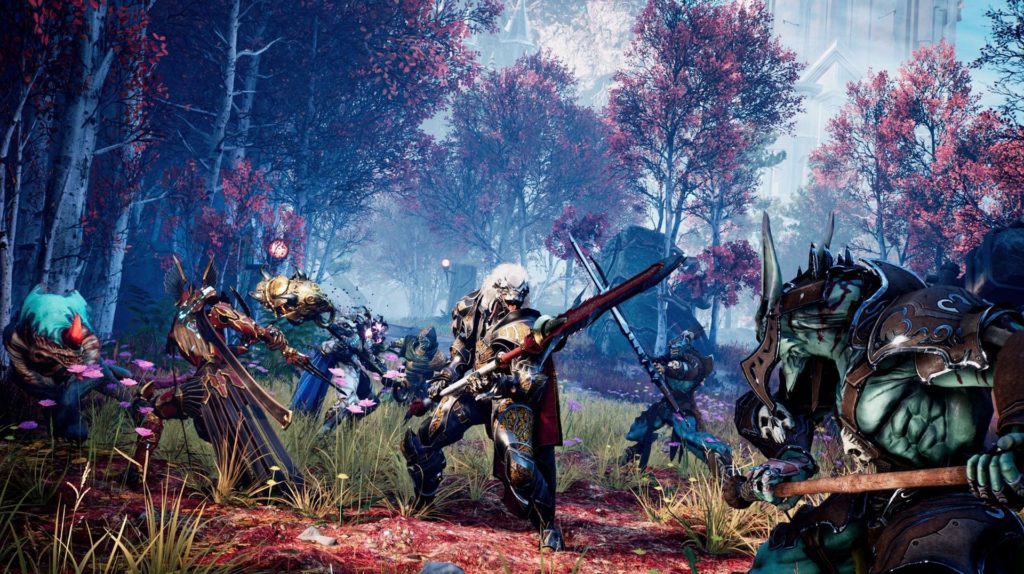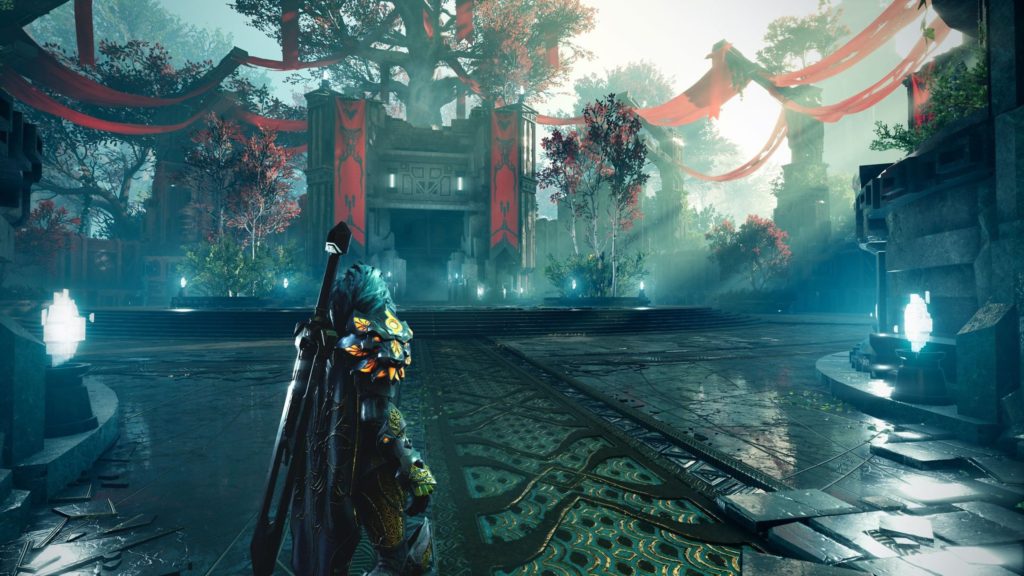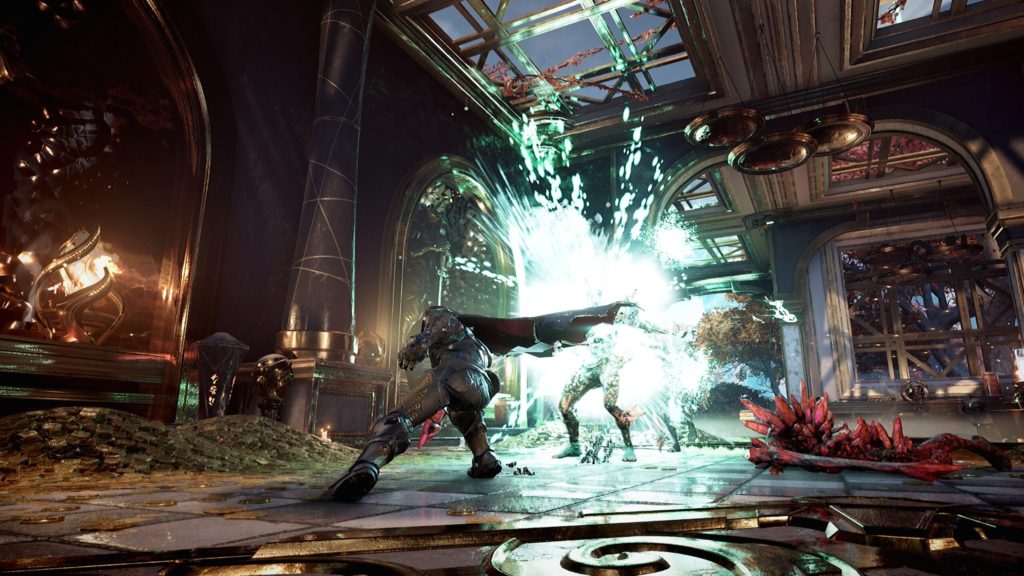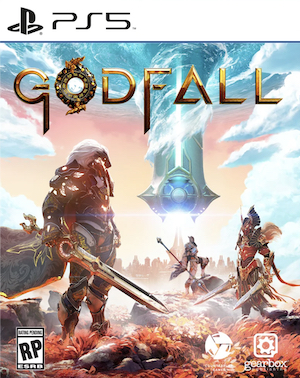
Godfall starts at the end of a war between two brothers. The details of how it started are glossed over. The long and short of it is that the big bad, Macros, wants to become a god. Orin – that’s you – wants to stop him. The war ends in a duel atop a tall tower overlooking the ocean. Because there has to be a story, Orin loses. But, like all bad guys with aspirations of absolute power, Macros makes a crucial mistake: instead of killing Orin then and there, he smashes him through the stone into the sea.
Naturally, Orin survives. You take control of him sometime later. Macros is on his way to godhood, and Orin has to take him down. Hence, Godfall. It’s not an imaginative premise, but Godfall isn’t an imaginative game. As I hacked and slashed my way through the game’s too-long tutorial, I marveled at how derivative Godfall was. How soulless it felt. How every second I spent playing it reminded me of something else.
" If you’ve played God of War, you’ll know how to do basically everything in Godfall because they play almost exactly the same."
The easiest thing to compare Godfall to is Sony Santa Monica’s 2018 reboot/sequel to the God of War series. If you’ve played God of War, you’ll know how to do basically everything in Godfall because they play almost exactly the same. Godfall just does everything worse. There are light and heavy attacks that can be chained into basic combos. There are skill trees to fill out, which upgrade your character and grant new abilities. Each of your two weapons comes with two special abilities that do extra damage. You can press a button to leap over specially marked obstacles and climb designated ledges. Enemies can be killed by either reducing their health to zero, or building up their stun meter, which allows you to execute them.
You have a retractable shield on your left arm that fans out on command so you can block and parry enemy attacks, except for the red ones, which, as in God of War, must be dodged. Pressing down both thumbsticks activates Archon’s Fury, which is this game’s version of Spartan Rage. Even the control schemes are almost identical.
Godfall’s art is similarly derivative. Its art style could be politely described as generic fantasy. A more specific description would be to day it’s combination of the art from WarCraft, Darksiders, and God of War. That’s not to say that Godfall doesn’t look good – it’s truly a gorgeous game – but you don’t have to squint hard to see where it’s taking its cues from, and absolutely nothing about its world or characters feels original.
"The best idea the game has is Soulshatter, which allows you to stack damage on enemies with light attacks before detonating it with heavy attacks."
It would be an understatement to say Godfall doesn’t make a good first impression. It’s impossible to care about the plot, because while the game clearly wants to lean into its lore, what’s here is so generic, poorly written, and filled with proper nouns that it impossible to follow beyond broad strokes. The same is true of the game’s characters. Orin is a cardboard cutout, and the supporting cast isn’t any better. Each of them communicates in dialogue that touches on one of the three things that character cares about and nothing else.
But, like all games of this type, you’re not here for the story. You’re here to play it. And here, Godfall is fine. Not good, not bad. Fine. After you unlock some skills, Godfall’s combat begins to open up. You can access to moves that require you to time specific attacks, opening up your combo possibilities, special attacks that stun or do area damage, and the like, and it makes Godfall’s take on the light/heavy paradigm that seems to dominate every modern action game enjoyable, if not particularly original.
The best idea the game has is Soulshatter, which allows you to stack damage on enemies with light attacks before detonating it with heavy attacks. The game also incentivizes risk by giving enemies powerful attacks that glow purple. These attacks hit hard but, if parried, leave the enemy stunned, allowing you to pour on the damage. Both of these systems incentivize you to take risks in combat and make the core systems feel more interesting than they’d be otherwise. To Godfall’s credit, the combat does improve once you have some new skills to make it interesting. It’s never great, but it is good enough to be compelling.
Godfall is the latest take on the loot genre – the developers describe it as a looter slasher – so killing enemies gives you loot, ranging from new weapons to rings and banners that provide stat bonuses. Like in World of WarCraft, all of this is color-coded from uncommon (white) to legendary (orange), and like in Word of WarCraft, the goal is to make your numbers go up until they are the best numbers in all the land. There’s a certain amount of personal preference here, especially when it comes to the weapons, which include longsword, great swords, war hammers, dual blades, pole arms and the like. Each weapon type has its own combos, timings, and special moves, so your choice matters. I liked all of the weapon types, but I was partially to longswords, great swords, and war hammers. The former are good all arounders while the latter two deal heavy damage to anyone unlucky enough to be in your way.
"Godfall absolutely bombards you with loot. Most of it is useless and you’ll only look at it long enough to scrap into resources you can spend to upgrade the stuff you like, but you’ll still spend a lot of time sorting through it."
Finding out what you like is important because Godfall absolutely bombards you with loot. Most of it is useless and you’ll only look at it long enough to scrap into resources you can spend to upgrade the stuff you like, but you’ll still spend a lot of time sorting through it. Most of the loot comes with secondary stats, or buffs effects like Bleed, which do damage over time, but Godfall is really bad at showing you what these effects look like in game. Mostly enemies change color, but it’s not always obvious what the different colors mean, so pure damage is probably your best bet.
Upgrading is done at the Sanctum, which is where you can also spend resources to by new Valorplates. Valorplates are the game’s version of armor, but they don’t actually seem to have a huge impact on your stats. What does change are your passive stats and the properties of your Archon’s Fury. Some summon friends to help you out, while others cause status effects and boost your damage. It’s not a huge deal, but it’s an extra set of customizations to play with. Interestingly, Orin takes on the appearance and voice associated with the Valorplate he’s wearing, so he can be either male or female depending on which one you choose.
When you’re not in the Sanctum, you’ll be out exploring the different areas. One’s a big forest that surrounds several constructs, another one seems to be underwater, and so on. These areas are large and open, which is good, since you’ll return to each of them several times to complete the various main and side missions. While I typically dislike backtracking, it largely didn’t bother me here… until it came to boss fights. These encounters require you to unlock them by gathering items you collect during certain missions, which can be a bit annoying and ruin the game’s pacing. It’s irritating to be told that you can go fight a boss only to have to spend the next half hour or so unlocking that boss. The boss fights themselves are a lot of fun (and the game is generous with mid-boss fight checkpoints), but it’s a shame that Godfall puts extra steps between you and the fun.
"almost everything about Godfall is aggressively mediocre and incredibly derivative."
The one area of Godfall that deserves unreserved praise is the game’s visual design. The aesthetic may be generic fantasy, but the game is gorgeous and runs extremely well. I ran it at 1080p and a largely stable 60 FPS at maximum settings with a RTX 2060 Super and an i5-6600K. The only performance issues I noticed were the odd stutter where the game seemed to skip ahead a few seconds. It was jarring when it happened, but rare enough that it didn’t bother me.
Godfall does support three player co-op, which can make even the worst games more fun, but since there doesn’t seem to be any matchmaking and friends must be invited directly, I was unable to test it.
Godfall is a difficult game to review. On the one hand, the combat gets pretty good if you give the game time to find its feet. On the other, almost everything about Godfall is so aggressively mediocre and incredibly derivative. It’s one thing to have a bad game that tries something new and fails. It’s another thing to have a game that doesn’t try anything new and seems to revel in its mediocrity. That’s the kind of game Godfall is. The combat is solid, but nothing about this game stands out. Its world and characters are boring, the game systems are blatantly lifted from other, better games, and its loot system seems to have no idea what to do but shower you in rewards and hope you like some of them.
Godfall is the kind of game that releases at the beginning of each generation: it looks and sounds good, but there’s nothing special about it. The combat can be fun, but the game as a whole is mediocre. If you’re looking to hack n’ slash your way through a fairly generic fantasy world and grab some loot along the way, then perhaps Godfall’s faults won’t bother you. But everyone else will see Godfall for what it is: something people buy to pass the time and show off their new graphics card or console and forget about once something better comes along. And like Godfall itself, that’s fine – but nothing more.
This game was reviewed on the PC.
The combat feels good. It looks good and runs well. Some cool environments. Boss fights are fun. Supports co-op.
Borrows almost all of its ideas from better games. The story is poorly written and it's difficult to care about the characters. Most loot is worthless. You have to unlock boss battles.



















